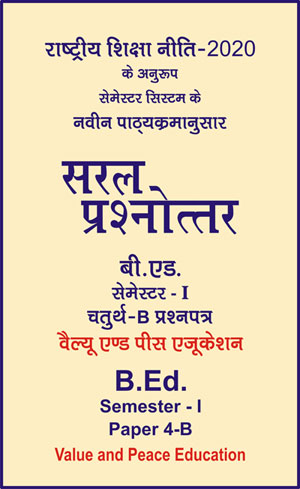|
बी एड - एम एड >> बी.एड. सेमेस्टर-1 प्रश्नपत्र-IV-B - वैल्यू एण्ड पीस एजुकेशन बी.एड. सेमेस्टर-1 प्रश्नपत्र-IV-B - वैल्यू एण्ड पीस एजुकेशनसरल प्रश्नोत्तर समूह
|
5 पाठक हैं |
||||||
बी.एड. सेमेस्टर-1 प्रश्नपत्र-IV-B - वैल्यू एण्ड पीस एजुकेशन (अंग्रेजी भाषा में)
Question- What do you mean by Globalization?
Answer -
Globalization has been presented in different and various definitions, such as globalization as an idea, globalization as a pattern or project, globalization as a process of human being’s history, globalization as a probable future, globalization as a situation, and finally, globalization as a trend (Nahavandian 2007). There aren’t one and single definition about the term of globalization. Everyone has seen it in his perspective. So, there are different opinions about it (Salimi 2005). Jan Aart Scholte (2000) has argued that at least five broad definitions of ‘globalization’ can be found in the literature.
Firstly, globalization as internationalization. Here, globalization is viewed as ‘simply another adjective to describe cross-border relations between countries’. It describes the growth in international exchange and interdependence. With growing flows of trade and capital investment there is the possibility of moving beyond an international economy (where ‘the principle entities are national economies’) to a ‘stronger’ version - the globalized economy in which, ‘distinct national economies are subsumed and rearticulated into the system by international processes and transactions’ (Hirst and Thompson 1996).
Secondly, globalization as liberalization. In this broad set of definitions, ‘globalization’ refers to ‘a process of removing government-imposed restrictions on movements between countries in order to create an “open”, “borderless” world economy’ (Scholte 2000). Those who have argued with some success for the abolition of regulatory trade barriers and capital controls have sometimes clothed this in the mantle of ‘globalization’.
Thirdly, globalization as universalization. In this use, ‘global’ is used in the sense of being ‘worldwide’ and ‘globalization’ is ‘the process of spreading various objects and experiences to people at all corners of the earth’. A classic example of this would be the spread of computing, television, etc.
Fourthly, globalization as westernization or modernization (especially in an ‘Americanized’ form). Here, ‘globalization’ is understood as a dynamic, whereby the social structures of modernity (capitalism, rationalism, industrialism, bureaucratism, etc.) are spread the world over, normally destroying pre-existent cultures and local self-determination in the process.
Fifthly, globalization as deterritorialization (or as the spread of supraterritoriality). Here, ‘globalization’ entails a reconfiguration of geography, so that social space is no longer wholly mapped in terms of territorial places, territorial distances and territorial borders. Anthony Giddens (1990) has thus defined globalization as the intensification of worldwide social relations which link distant localities in such a way that local happenings are shaped by events occurring many miles away and vice versa. David Held et al. (1999) define globalization as a ‘process (or set of processes) which embodies a transformation in the spatial organization of social relations and transactions -assessed in terms of their extensity, intensity, velocity and impact -generating transcontinental or inter-regional flows and networks of activity’.
Globalization should be understood as a multi-pronged process, since deterritorialization, social interconnectedness, and acceleration manifest themselves in many different (economic, political, and cultural) arenas of social activity. Although each facet of globalization is linked to the core components of globalization described above, each consists of a complex and relatively autonomous series of empirical developments, requiring careful examination in order to disclose the causal mechanisms specific to it (Held et al. 1999).
These are various definitions about globalization which have been presented. My understanding of globalization is compatible to the latter definition. In which globalization is as a trend and process of the far past and is continued to the present time and will be continued in the future, too. Along this process all the phenomena and social problems of human beings are being changed from the individual, racial, local and national into global ones. In this process the human being lives are more related and dependent on each other. Subsequently, instead of racial, local, and national different societies, there will be conformed a single and united global society. In this global society, all the people have memberships and have a dependency and concern toward it (Ohmae 1990). So, with cooperation and collaboration they attempt to remove their needs and the difficulties of global society which can be removed (Keohane and Nye 1977).
With the definition presented here, the specific changes will appear in the globalization process which are such as :
(1) the removal of the borders which separate the societies of the human beings,
(2) fading away of racial, local and national issues and replacement of these with the faithfulness to global issues instead,
(3) the appearance of global citizenship instead of national citizenship,
(4) the association of all human beings in societies together and the expansion of communication and the contact among these societies,
(5) the formation of global cultural and the promotion of common values accepted by all the worldwide people,
(6) devaluation of racial, local and national institutions because of the importance of all the global and transnational organizations and institutions,
(7) the formation of international general laws and the empowerment of global organizations, and
(8) appearance of global phenomena and issues. These changes are not confined to specific areas such as political or economical ones. But it covers all the fields of human being’s life. Therefore, as the result of globalization process, it contains all the human being life dimensions and causes their transform and changes. One of these areas is the field of international relations.
|
|||||













